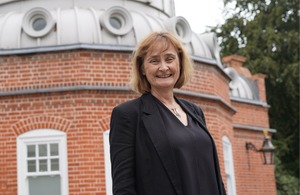First woman appointed as new Astronomer Royal
Professor Michele Dougherty has been approved by The King to be the new Astronomer Royal, and will be the first woman to hold this position since the role was first created in 1675.

- His Majesty The King has approved Professor Michele Dougherty as the new Astronomer Royal
- Professor Dougherty will be the first woman to hold this role since its creation 350 years ago
- The previous appointment, Lord Rees, is retiring from the role
Professor Michele Dougherty has been approved by The King to be the new Astronomer Royal, and will be the first woman to hold this position since the role was first created in 1675.
The role of Astronomer Royal was first created with the goal of discovering how to determine longitude at sea when out of sight of land, and the holder of this position was based at the Royal Observatory in Greenwich.
Today, the role is an honorary one, awarded to a prominent astronomer who is expected to advise the Monarch on astronomical matters.
Professor Dougherty will hold the role alongside her current positions as Executive Chair of the Science and Technology Facilities Council, President-elect of the Institute of Physics and a Professor of Space Physics at Imperial College London.
Speaking of her new appointment, Professor Michele Dougherty said:
I am absolutely delighted to be taking on the important role of Astronomer Royal. As a young child I never thought I’d end up working on planetary spacecraft missions and science, so I can’t quite believe I’m actually taking on this position. In this role I look forward to engaging the general public in how exciting astronomy is, and how important it and its outcomes are to our everyday life.
The Government Chief Scientific Adviser, Professor Dame Angela McLean, said of the appointment:
Warm congratulations to Professor Michele Dougherty on her appointment to the distinguished position of Astronomer Royal. This is a fitting recognition of her outstanding work and enduring commitment to the field of astronomy.
The government currently has funding in place to improve the involvement of women in STEM, with 7,500 girls being eligible for support as part of an £8.2m package to improve participation and teaching of advanced maths.
In addition, the government funds the STEM Ambassadors programme - a nationwide network of more than 28,000 volunteers, who engage with young people to spark interest in STEM subjects, and 48% of these volunteers are women.